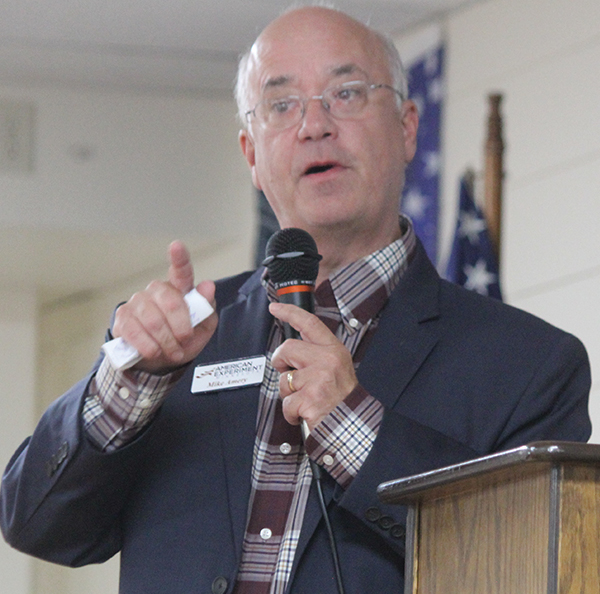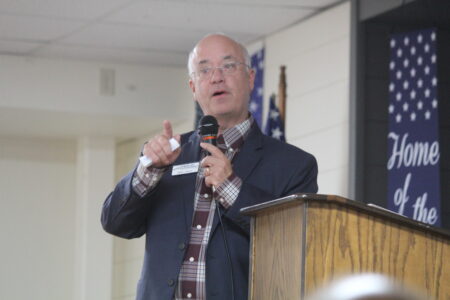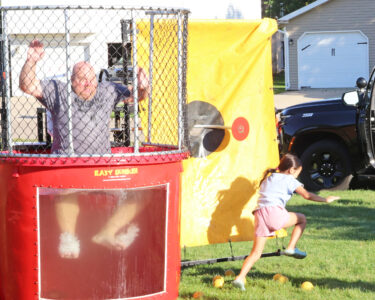Speakers say Greater MN a key area for GOP

Photo by Deb Gau Mike Amery of the Center of the American Experiment spoke to the Lyon County Republicans at an event in Ghent Monday.
GHENT — In the 2026 Minnesota state elections, the focus for Republicans will be on Greater Minnesota, speakers at a Lyon County Republicans event said this week.
“Why Greater Minnesota? Because this is where the conservative votes are,” said Mike Amery, director of Greater Minnesota outreach for American Experiment, a conservative think tank and policy organization.
Amery was one of the speakers at the Lyon County Republicans’ fall dinner Monday night in Ghent. In addition to a keynote speech from conservative advocate and Republican governor candidate Kendall Qualls, area residents also heard from state legislators.
All of the speakers at Monday’s event discussed the growth in the conservative movement in Greater Minnesota, and how that could factor into upcoming elections.
“I am going all over the state talking to conservatives and Republicans and even libertarians about the conservative movement in Minnesota and why it’s so important now,” Amery told the audience.
“American Experiment has been around for 35 years. It’s been primarily focused on the Twin Cities,” Amery said. “But we are expanding in Greater Minnesota.”
He said American Experiment now has five Greater Minnesota chapters, including chapters in west central Minnesota and Mankato.
Amery said places like Lyon County have a history of voting Republican, and Republican candidates had been picking up more of the vote over the past 30 years.
The last time that Lyon County voted for a Democrat in a presidential election was for Bill Clinton in 1996, Amery said.
“And the vote numbers are changing,” he said.
In the 2000 presidential election, George W. Bush received 53% of the vote in Lyon County, Amery said. In 2024, Donald Trump got 65% of the vote in Lyon County.
“It shows that the number of Republican voters out here is going up,” he said. “In 2024, 60 of Minnesota’s 87 counties went red.”
Amery said American Experiment was working to make inroads in the parts of the state where the conservative voter base was growing.
“What we are trying to do is use our content, use our website, our magazine, our podcast, everything that we’ve got to educate Minnesotans across the state,” Amery said.
American Experiment also did a “Minnesota DOGE tour” this year, talking about ways to cut state spending, Amery said. The tour made stops in Marshall and Willmar, he said.
In his keynote address, Qualls spoke about the history and impact of the Republican party. Qualls said Republican ideals resonated with people regardless of race or background.
“The principles of the Republican Party are universal for everyone. We just do a lousy job of marketing and selling it,” he said.
Qualls said currently, the U.S. states with the most outmigration are Democrat-led.
“Where are they going? They’re going to Republican-led states,” he said. “Even in our state, the people that have left the Twin Cities, they’ve gone to Republican-led counties. They’ve gotten out of the blue counties.”
“People have been voting with their feet. Our job is that we have to do a better job of connecting the dots for them,” he said.
Qualls said Republicans needed state government candidates that not only had conservative values, and energized the party, but that had broad appeal to swing voters.
“I think if we focus on that type of thing, we identify that candidate early, get behind that candidate, we’ll win statewide,” Qualls said. “If we work together as a Republican party, and we get this kind of candidate, we can not only win the governor’s office, we can win the Senate and the House for the first time since 1969. And I’m telling you, I believe this is the time to do it.”
State legislators, Sen. Gary Dahms and Rep. Chris Swedzinski, also touched on the importance of voter turnout for upcoming state races.
“If we take a look at what happened in 2023 in the Minnesota Senate, we lost the majority by around 350 votes,” Dahms said. “In every Senate district, there’s about 86,000 constituents, probably 50,000 voters, and we would have just needed a very, very few people to get out and vote on the Republican side and we would have won that seat.”
Losing a Republican majority in the Senate meant an $18.5 billion deficit in Minnesota, and taxes and fees being raised by $10 billion, Dahms said. State government spending has increased over the past 12 years, he said.
Dahms said the 2026 state elections would not be easy.
“We need to make sure that we’re doing everything we can to get state officers elected on the Republican side, get the governor’s office on the Republican side, get the house on the Republican side. I don’t know that we can get a trifecta, but it sure would be fun,” Dahms said. “Even if we can’t, we need to get one or two legs of the stool so we can really stop a lot of stuff.”
Swedzinski reflected more on engagement and the values that Minnesota Republicans needed to show. Swedzinski asked area residents to think about why they do civic engagement.
“It’s not for the faith, it’s not for the political thought that we hold. It’s how do you pass that on? How do we pass this country on as a baton in a race, in better condition than you found it,” he said. “You don’t do it by growing government. You don’t do it by spending us out of control. You give it by having a government that is correct in size, that fills the roles that our founding fathers had in mind when they created this country.”




